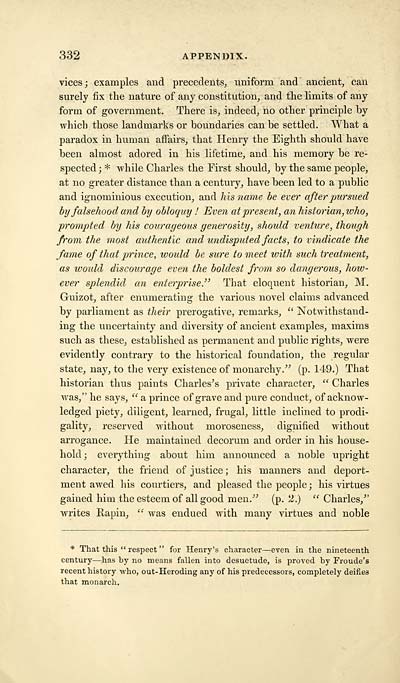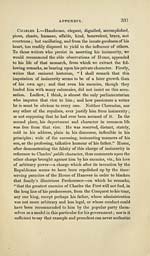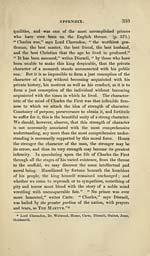Descendants of the Stuarts
(388) Page 332
Download files
Complete book:
Individual page:
Thumbnail gallery: Grid view | List view

332 APPENDIX.
vices; examples and precedents, iiniform and ancient, can
surely fix the nature of any constitution, and tlie limits of any
form of government. There is, indeed, no other principle by
which those landmarks or boundaries can be settled. What a
paradox in human affairs, that Henry the Eighth should have
been almost adored in his lifetime, and his memory be re-
spected ; * while Charles the First should, by the same people,
at no greater distance than a century, have been led to a public
and ignominious execution, and his name be ever after pu7'sued
by falsehood and by obloquy I Even at present, an historian, who,
prompted by his courageous generosity, should venture, though
from the most authentic and undisputed facts, to vindicate the
fame of that prince, would be sure to meet with such treatment,
as woidd discourage even the boldest from so dangerous, how-
ever splendid an enterprise!" That eloquent historian, M,
Guizot, after enumerating the various novel claims advanced
by parliament as their prerogative, remarks, " Notwithstand-
ing the uncertainty and diversity of ancient examples, maxims
such as these, established as permanent and public rights, were
evidently contrary to the historical foundation, the regular
state, nay, to the very existence of monarchy." (p. 149.) That
historian thus paints Charleses private character, " Charles
was," he says, " a prince of grave and pure conduct, of acknow-
ledged piety, diligent, learned, frugal, little inclined to prodi-
gality, reserved without moroseness, dignified without
arrogance. He maintained decorum and order in his house-
hold; everything about him announced a noble upright
character, the friend of justice ; his manners and deport-
ment awed his courtiers, and pleased the people; his virtues
gained him the esteem of all good men." (p. 2.) " Charles,"
writes Rapin, " was endued with many virtues and noble
* That this " respect " for Henry's character — even in the nineteenth
century — has by no means fallen into desuetude, is proved by Froude's
recent history who, out-Heroding any of his predecessors, completely deiiies
that monarch.
vices; examples and precedents, iiniform and ancient, can
surely fix the nature of any constitution, and tlie limits of any
form of government. There is, indeed, no other principle by
which those landmarks or boundaries can be settled. What a
paradox in human affairs, that Henry the Eighth should have
been almost adored in his lifetime, and his memory be re-
spected ; * while Charles the First should, by the same people,
at no greater distance than a century, have been led to a public
and ignominious execution, and his name be ever after pu7'sued
by falsehood and by obloquy I Even at present, an historian, who,
prompted by his courageous generosity, should venture, though
from the most authentic and undisputed facts, to vindicate the
fame of that prince, would be sure to meet with such treatment,
as woidd discourage even the boldest from so dangerous, how-
ever splendid an enterprise!" That eloquent historian, M,
Guizot, after enumerating the various novel claims advanced
by parliament as their prerogative, remarks, " Notwithstand-
ing the uncertainty and diversity of ancient examples, maxims
such as these, established as permanent and public rights, were
evidently contrary to the historical foundation, the regular
state, nay, to the very existence of monarchy." (p. 149.) That
historian thus paints Charleses private character, " Charles
was," he says, " a prince of grave and pure conduct, of acknow-
ledged piety, diligent, learned, frugal, little inclined to prodi-
gality, reserved without moroseness, dignified without
arrogance. He maintained decorum and order in his house-
hold; everything about him announced a noble upright
character, the friend of justice ; his manners and deport-
ment awed his courtiers, and pleased the people; his virtues
gained him the esteem of all good men." (p. 2.) " Charles,"
writes Rapin, " was endued with many virtues and noble
* That this " respect " for Henry's character — even in the nineteenth
century — has by no means fallen into desuetude, is proved by Froude's
recent history who, out-Heroding any of his predecessors, completely deiiies
that monarch.
Set display mode to:
![]() Universal Viewer |
Universal Viewer | ![]() Mirador |
Large image | Transcription
Mirador |
Large image | Transcription
Images and transcriptions on this page, including medium image downloads, may be used under the Creative Commons Attribution 4.0 International Licence unless otherwise stated. ![]()
| Histories of Scottish families > Descendants of the Stuarts > (388) Page 332 |
|---|
| Permanent URL | https://digital.nls.uk/94932634 |
|---|
| Description | A selection of almost 400 printed items relating to the history of Scottish families, mostly dating from the 19th and early 20th centuries. Includes memoirs, genealogies and clan histories, with a few produced by emigrant families. The earliest family history goes back to AD 916. |
|---|

